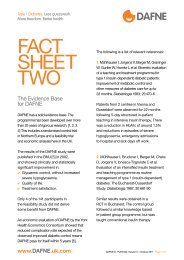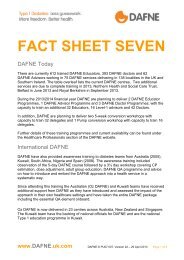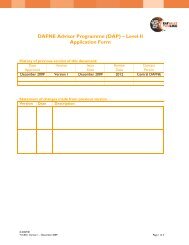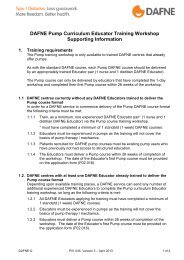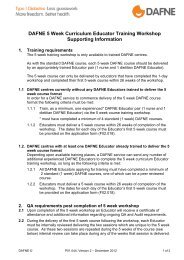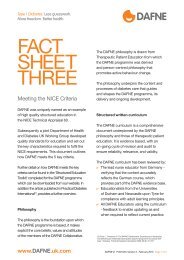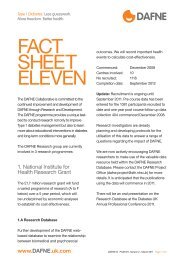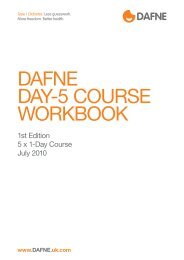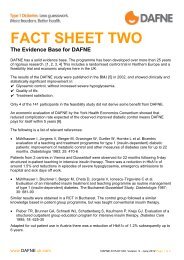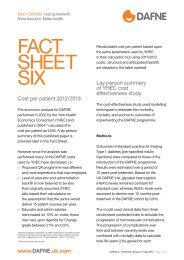What happens to blood glucose overnight - Dr Pratik ... - Dafne
What happens to blood glucose overnight - Dr Pratik ... - Dafne
What happens to blood glucose overnight - Dr Pratik ... - Dafne
Create successful ePaper yourself
Turn your PDF publications into a flip-book with our unique Google optimized e-Paper software.
<strong>What</strong> <strong>happens</strong> <strong>to</strong><br />
<strong>blood</strong> <strong>glucose</strong><br />
<strong>overnight</strong>?<br />
<strong>Dr</strong> <strong>Pratik</strong> Choudhary<br />
Senior Lecturer and Consultant in Diabetes
Frequency of nocturnal<br />
hypoglycaemia<br />
UK Hypoglycaemia study ; Diabe<strong>to</strong>logia, 2007<br />
% patients with at least 1 noct<br />
hypo over 5 days of CGM
Effect of nocturnal<br />
hypoglycaemia<br />
• Fear of hypos<br />
• 55% of SH in DCCT were nocturnal<br />
• 18% absentee-ism the day after<br />
nocturnal hypoglycaemia<br />
• Decreased work performance following<br />
day<br />
• Reduced consolidation of memory<br />
<strong>overnight</strong>
Overnight balance<br />
Glucago<br />
n<br />
Insulin<br />
Alcohol<br />
Exercise<br />
Inadequate basal<br />
Illness
Fasting<br />
hyperglycaemia<br />
Glucose ( mmol/l)<br />
Hypoglycaemia<br />
Time
The dawn<br />
phenomenon<br />
• > 10,000 patients surveyed<br />
• Marked basal rise between<br />
0400 - 0800 in post pubertal<br />
patients.<br />
• Seen in 20-30% T1 pts<br />
• Due <strong>to</strong> a rise in frequency<br />
and amplitude of growth<br />
hormone pulses through the<br />
night<br />
• Possible contribution from<br />
increase in cortisol in the<br />
morning<br />
Bachran et al; Pediatric Diabetes 2012: 13: 1–5
Dawn Or Somogyi??<br />
Breakfas<br />
t
• 5 pts with “unmanageable”<br />
diabetes<br />
• Treated with 3 -4 times /<br />
day soluble insulin<br />
• Recurrent DKA and SH<br />
• Insulin dose reduces from<br />
60-70 units down <strong>to</strong> 18-30<br />
units<br />
• 2 further pts, one who<br />
came off insulin<br />
“Hypoglycaemia begets<br />
hyperglycaemia”<br />
American Journal of Medicine; 1959
Reduced insulin levels as long acting insulin<br />
ran out were associated with high <strong>blood</strong><br />
<strong>glucose</strong> levels
NEJM;<br />
1998
T1DM<br />
Normal<br />
Diabetes, 2003
Hoi-Hansen et al; Diabe<strong>to</strong>logia<br />
(2005)
Much of the variability in<br />
fasting BG comes form the<br />
night before
Data from Sheffield<br />
• The data is unpublished so unfortunately I<br />
cannot provide the visual graphs<br />
• However:<br />
• If fasting <strong>glucose</strong> is < 5 80% chance<br />
that the patient had a nocturnal hypo<br />
• There were NO instances of <strong>overnight</strong><br />
hypoglycaemia that resulted in a high<br />
fasting <strong>glucose</strong> in over 100 nights
Contd….<br />
• Night time hypos were spread equally<br />
through the night<br />
• 30% of patients had well controlled <strong>overnight</strong><br />
<strong>glucose</strong> with high fasting <strong>glucose</strong> <br />
Dawn phenomenon<br />
• Bedtime capillary <strong>glucose</strong> had NO predictive<br />
value for <strong>overnight</strong> hypoglycaemia
Much of the variability in<br />
fasting BG comes form the<br />
night before
Summary<br />
• Nocturnal hypoglycaemia is common<br />
• Low fasting <strong>glucose</strong> is an important marker<br />
of <strong>overnight</strong> hypoglycaemia<br />
• Very little evidence <strong>to</strong> support Somogyi<br />
effect.<br />
• 3 am test / CGM can be used <strong>to</strong> identify<br />
nocturnal hypos / Dawn phenomenon<br />
• Much of the variability in fasting <strong>glucose</strong><br />
comes from the evening meal..
Thank you...
Relationship of fasting<br />
and nadir <strong>glucose</strong>




